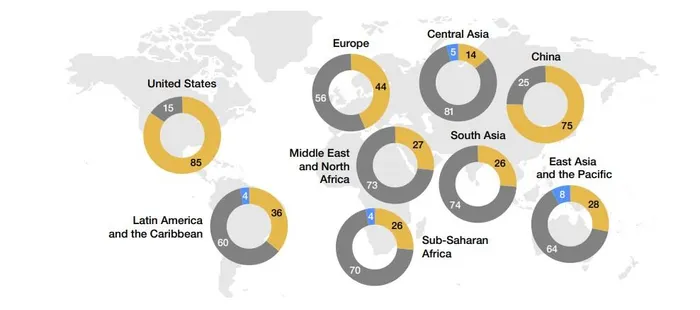Global economy in transformative phase, say WEF chief economists
GLOBAL ECONOMY

Notably, 72% of chief economists surveyed anticipate a deterioration in global economic conditions over the next year—a sentiment echoed across numerous economies facing prolonged instability.
Image: Supplied
The latest World Economic Forum (WEF) chief economists' outlook for September paints a stark picture of a global economy grappling with persistent disruptions and mounting uncertainty.
This analysis, corroborated by South African economists, emerges from a comprehensive survey involving chief economists from various sectors, including Old Mutual Group's chief economists, Johann Els.
In a revealing appraisal, the report highlights a resilience amidst turbulence, yet underscores that growth prospects remain subdued, with significant risks skewed to the downside.
Notably, 72% of chief economists surveyed anticipate a deterioration in global economic conditions over the next year—a sentiment echoed across numerous economies facing prolonged instability.
The WEF report underscores the impact of recent tariffs imposed by the United States on a multitude of countries, initiating a recalibration of global supply chains and investment flows.
While the depreciation of the dollar has afforded emerging economies greater monetary flexibility, it has simultaneously amplified the domestic implications of these tariffs.
“The dollar’s sharp depreciation has granted emerging economies greater monetary flexibility, but also amplified the domestic impact of tariffs,” it said.
In addition, the rapid advancement of artificial intelligence (AI) presents another layer of uncertainty. Most chief economists foresee AI turning commercially disruptive within the next year, although opinions on its effects on the labour market present a divided landscape.
“The rapid pace of AI development is adding another layer of uncertainty, with most chief economists expecting the technology to become commercially disruptive within the next year, while views on labour market impacts remain divided,” it said.
“The rise of AI is driving a structural shift in technology and innovation, as well as reshaping energy demand and fuelling geopolitical competition over high-tech inputs.”
The outlook reveals a pronounced regional divergence. The US faces a subdued economic landscape, burdened by significant trade policy shifts and inflationary pressures.
Conversely, Europe’s recovery is fragile yet showing signs of improvement, driven by stable employment figures and controlled inflation. While China's growth remains relatively robust, it faces slow momentum and persistent deflationary threats.
More encouragingly, the WEF Outlook suggests a strengthening of growth prospects for Sub-Saharan Africa. While 29% of chief economists foresee weak growth, a considerable 71% predict moderate to strong growth in the coming year.
The World Bank projects a 3.7% regional growth rate by 2025, climbing to an average of 4.2% for 2026-2027 if external factors stabilise, inflation moderates, and political conflicts lessen.
Nevertheless, caution is warranted due to newly instituted US tariffs ranging between 10% and 30% affecting many countries in the region.
Inflation remains a critical concern, yet pressures appear to be easing. A significant 76% of chief economists expect moderate inflation going forward, despite an early 2025 disinflation stall attributed to climbing food prices.
Additionally, the report indicates that fiscal policies are projected to remain largely unchanged, although a rising number of economists (17%, up from 4% in April) expect tighter financial conditions ahead.
Similarly, monetary policy is expected to maintain the status quo, with 70% of chief economists not anticipating any major adjustments.
Professor Waldo Krugell, an economist at North-West University, said this was in line with the latest International Monetary Fund (IMF) view. Krugell added that the focus on changes in the structure of the world economy was interesting.
“Uncertainty is a major theme. It is specifically trade uncertainty that ends up limiting investment and economic growth. At the same time, they mention inflation fears,” he said.
“I don't think the US market or the dollar will lose their importance any time soon, but change is in the air.”
Unisa economist Dr Eliphas Ndou said that he was not surprised by the report.
“The rising global debt and prevailing trade and policy uncertainty threaten financial stability through tightening financial conditions,” he said.
“The rise in these two indicators points towards weaker growth in the near future, thereby diminishing fiscal space for governments and central banks’ policy rate cuts to stimulate their economies.”
BUSINESS REPORT